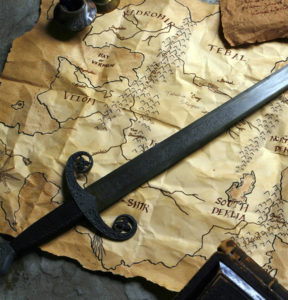The Sword Endures
The worlds of fantasy and science fiction branch into so many subgenres, you could spend an entire afternoon trying to determine exactly where the story you are reading truly fits. And each of those subgenres experiences an ebb and flow of popularity. One year cyberpunk rules the realm of book sales; in another time, steampunk holds center stage. Vampires or zombies? Gothic, urban, contemporary—or a mix of all three?
 Beneath this current of shifting tastes in speculative fiction, the audience for traditional fantasy remains. You can always count on finding new books about sword-slingers, and authors can reliably count on encountering an audience for such stories. But what is it about the image of the sword in particular that endures so long beyond a time when the weapon has become little more than a collector’s item?
Beneath this current of shifting tastes in speculative fiction, the audience for traditional fantasy remains. You can always count on finding new books about sword-slingers, and authors can reliably count on encountering an audience for such stories. But what is it about the image of the sword in particular that endures so long beyond a time when the weapon has become little more than a collector’s item?
It’s significant that in the Bible, the sword appears from Genesis to Revelation—and I don’t think that only has to do with the audience that was living during the time of the books’ writing. After all, if the Bible is God’s inspired word, he could have chosen to inspire it at any point in history, or he could have given those who penned its words the vision to explain some sort of weapon besides a sword. We can be fairly certain Christ’s return will come at a time when ballistic weapons are part of the world’s technology, and yet, the Bible paints Christ as a wielder of a sword as his weapon of winnowing. Will it be a literal sword? Perhaps not. But why the choice of the imagery then, and what does that have to do with fantasy-lover’s innate appreciation for blade-based combat?
The way a sword requires the wielder engage his opponent has a lot to do with the fantasy reader’s fascination with them. Sword combat requires a combatant face his opponent, unflinching, and to be fully intentional about his engagement in the battle. Sword combat is highly personal. A swordsman cannot deny his clear connection to the damage he deals with his weapon.
In the same way, we know there is nothing haphazard about the way God will one day choose to defeat the enemy. No cross-fire, no collateral damage—just a series of very intentional strokes of a well-honed weapon meant for one purpose.
 I believe fantasy readers long for the nobility, the bravery, the ownership of one’s actions a well-wielded sword requires. Fantasy is one of the few places in the literary world where clear delineations between good and evil get the spotlight, and in a similar way, a swordsman who fights in an underhanded way can only do so if he dares cheat within blade’s reach of the opponent he wrongs.
I believe fantasy readers long for the nobility, the bravery, the ownership of one’s actions a well-wielded sword requires. Fantasy is one of the few places in the literary world where clear delineations between good and evil get the spotlight, and in a similar way, a swordsman who fights in an underhanded way can only do so if he dares cheat within blade’s reach of the opponent he wrongs.
We love the sword because of the romanticism attached to a fighter who will stand his ground when evil is close enough to literally crush him. We resonate with the sword as a weapon that stands for truth, just as the Biblical Sword of the Spirit is God’s word—something to be wielded with skill and strength as part of our defense against our enemies, and more importantly, in the winning of a lost world. Whether the enduring appreciation of the sword is culturally generated, spiritually ingrained, or a little of both, there is no denying the subtle mystique that surrounds the weapon itself. And even more so, the one who wields it.







































That’s cool, Rebecca. I had never thought of it that way!
I love this statement: “No cross-fire, no collateral damage—just a series of very intentional strokes of a well-honed weapon meant for one purpose.” That is not an image you can create with weapons of today.
And here’s my completely geeky observation: As you say, the Sword of the Spirit is “God’s word.” (See the bold? Yes, I am that nerdy.)
Thanks for those words of encouragement and agreement, Kat,and I don’t think you’re nerdy at all, even with the bold-face type. 🙂 It’s also not lost on me how similar the look of a sword and the look of a cross are. I could draw the metaphor out to death! But God’s word as a sword is an image I particularly like.
Thanks for dropping in today. 🙂
I believe that this was not lost on the medieval Europeans, either. Part of the romanticism we attach to swords may be cultural, remnants of Western chivalry. However, the reason the medieval Europeans saw the cross in their straight-bladed swords may go deeper, and cross cultural lines.
I don’t think there’s anything inherently more romantic about the typical Western “longsword” than any other type of sword. The Japanese katana is really at least as romanticized. Yet these different swords from different cultures may have become so significant because of a common significance that the ancients saw in the basic weapon itself.
Very true–the katana carries with it a wealth of symbolism about honor and sacrifice, so it’s not just the straight blades that get the sense of awe attached to them, that’s for certain. Despite the style of the blade and the culture that wields it, think it’s part of the human condition to resonate with what the weapon stands for.
Thanks for your thoughts, Bainspal! Good to see you here.
I love how you point out that the sword appears from Genesis to Revelation! I’d never seen that before.
I appreciate you coming by to read my thoughts today–isn’t it fun when we can get a fresh look at something through someone else’s observations!
Thanks for reading and commenting. 🙂
Wow. This is amazing and insightful. I had never thought of the valor of sword-wielding that way (and I love your phrase “blade based combat”!). Thank you for sharing these wonderful observations!
Blessings,
Literaturelady
I am humbled by your kind comments. It’s not every day a person gets to be labeled insightful. You made my day! Thanks for coming by and sharing your appreciation with me.
The other day, my pastor mentioned how the Levites slew the Israelites after they made the golden calf.
Pastor: Generally, it’s frowned upon to take up running around with a sword slashing people’s heads off.
Which is true, but I still want one. A sword, that is. Not someone else’s head. Also makes me think of a quote from the Binding of the Blade series (from memory)
“The sword must be a thinking man’s weapon. They always entrust the army to the guy with the sword. Never the guy with the spear or the bow and arrows or the war hammer. Prejudice. “
“That must be it. It has nothing to do with the fact most soldiers carry swords, nor the fact that most guys with war hammers just come across as lugs who like to smash things.”
———–
That’s an awesome quote…something about the choice of weapon says something about the warrior, huh? I’m glad to be in agreement with other great minds in the literary world.
Thanks for sharing that and for joining me over here today.
You’re quite welcome! 🙂
Wow. I just discovered today why I love swords so much. I’ve never thought much about it, and always just assumed it’s because they are mainstays of fantasy, but you are right — they are so much more because of what they symbolize.
Lovely post.
This is absolutely brilliant, and the kind of post I hope for from a blog. Thanks so much for putting words to this concept. I never would have thunk it up.
I’m going to go sharpen my sword now.
Wow! Great post. I’d never thought about swords this way before. Posts like this are why I love this blog!